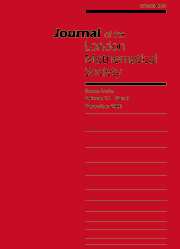Article contents
ON THE ZEROS OF SOLUTIONS OF LINEAR DIFFERENTIAL EQUATIONS OF THE SECOND ORDER
Published online by Cambridge University Press: 01 October 1998
Abstract
Let u be a solution of the differential equation u″+Ru=0, where R is rational. Newton's method of finding the zeros of u consists of iterating the function f(z)=z−u(z)/u′(z). With suitable hypotheses on R and u, it is shown that the iterates of f converge on an open dense subset of the plane if they converge for the zeros of R. The proof is based on the iteration theory of meromorphic functions, and in particular on the result that, if the family of K-quasiconformal deformations of a meromorphic function f depends on only finitely many parameters, then every cycle of Baker domains of f contains a singularity of f−1. This result, together with classical results of Hille concerning the asymptotic behaviour of solutions of the above differential equations, is also used to study their value distribution. For example, it is shown that, if R is a rational function which satisfies R(z)∼amzm as z→∞ and has only k distinct zeros where k<(m+2)/2, then δ(0, u)[les ]k/(m+2−k)<1.
Information
- Type
- Notes and Papers
- Information
- Copyright
- The London Mathematical Society 1998
- 4
- Cited by

